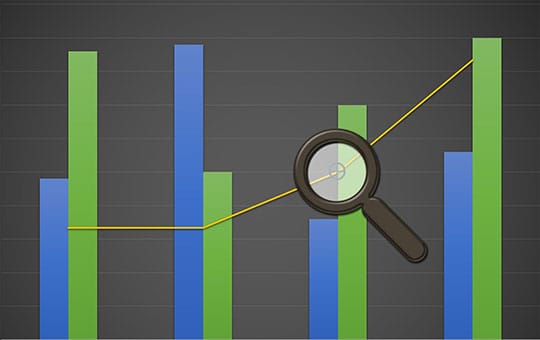In the blogging world, analytical tools are crucial for growing your online presence. By understanding your traffic’s behavior, you cannot only establish your performance goals, but you can also improve your user’s experience and your website’s traffic.
These analytical tools help you monitor your website’s performance by offering you valuable insights regarding your blog visitors. You can see the pages they access, the buttons they click, the time they spend on your site, and so much more. With all this information at your fingertips, you’ll be able to lead your blog to unbelievable success.
Well, in today’s article, we’re presenting 5 essential analytical tools that you may leverage to take your blog to the next level in 2018.
1) Google Analytics
 In 2005, Google launched Google Analytics, a large analytics platform that is meant to help every webmaster track and measure his website’s statistics. This is, without a doubt, the most popular analytical tools out there because it does not only allow you to spot the poorly performing pages but also shows you the provenience of your visitors and the length of their visit on your website.
In 2005, Google launched Google Analytics, a large analytics platform that is meant to help every webmaster track and measure his website’s statistics. This is, without a doubt, the most popular analytical tools out there because it does not only allow you to spot the poorly performing pages but also shows you the provenience of your visitors and the length of their visit on your website.
Moreover, all the information that Google Analytics puts at your disposal happens to be in real-time. How is this possible? Well, there’s a “Google Analytics Tracking Code” which you will add to each page of your website, so Google will have permission to detect every new website visitor along with his actions.

2) SEMrush
 SEMrush is the best analytical tool for analyzing your competition and also for receiving insights on what they do. It is a premium tool because it helps you find keywords with less competition, compare your domain with your competition’s domains, identify your local competitors and new niche players, and much more.
SEMrush is the best analytical tool for analyzing your competition and also for receiving insights on what they do. It is a premium tool because it helps you find keywords with less competition, compare your domain with your competition’s domains, identify your local competitors and new niche players, and much more.
This is the one tool that can grant you a huge competitive advantage. Start with the free version, as it provides you with more than you need to begin measuring. The monthly subscription is definitely worth its price once you’ve gone through the basics, as you’ll be able to leverage additional features that your niche competitors are not even dreaming of.
Recommended for you: How Small Businesses Can Use Mobile Search Marketing.
3) Content Analytics by Sumo
 You’d probably assume that your calls-to-action (CTAs) are well placed or that your content is performing at the highest performances. Well, in today’s fast-changing marketplace, just assuming that your blog works well is not enough.
You’d probably assume that your calls-to-action (CTAs) are well placed or that your content is performing at the highest performances. Well, in today’s fast-changing marketplace, just assuming that your blog works well is not enough.
Sumo Company offers one of the best content analytics tools that you can use to confirm your suppositions. It shows you where each of your blog visitors has paused or stopped their reading. Moreover, you’ll be able to figure out the average time your visitors spend on your posts and pages.
Furthermore, this information is live, allowing you to optimize your blog posts in accordance with your visitor’s reaction. Lastly, it helps you figure out the best places to add your CTA buttons, so the majority of your traffic can remark them.

4) KYA WordPress Plugin
 KYA is a fantastic WordPress analytics tool, as it gives you precise feedback concerning your website’s bounce rate. Simply put, KYA excels at showing you what your blog visitors don’t like about your content or pages. When you understand what’s turning your traffic off, what makes them bounce off your site, you should immediately optimize by producing changes.
KYA is a fantastic WordPress analytics tool, as it gives you precise feedback concerning your website’s bounce rate. Simply put, KYA excels at showing you what your blog visitors don’t like about your content or pages. When you understand what’s turning your traffic off, what makes them bounce off your site, you should immediately optimize by producing changes.
This tool collects a lot of information related to your visitors’ behavior and builds unique reports that can help you figure out the next content topics you should create to make a stronger impact in the future. And these are just a few things KYA is offering!
You may also like: 7 Excellent & Creative Strategies To Win in Digital Marketing.
5) Momently
 Momently is a new yet very promising player in the blog analytics industry. This unique software allows you to track anything you want. It is a complete analytics package that you can count on, no matter what.
Momently is a new yet very promising player in the blog analytics industry. This unique software allows you to track anything you want. It is a complete analytics package that you can count on, no matter what.
One of the main benefits of this platform is that the data it provides is super easy-to-understand and actionable at the same time. Momently is probably the platform that digs the deepest into content analytics. As I said, this tool is new, so that you can expect much more from it in the future.
Conclusion

Now that you have all this information at your fingertips, you should choose the analytical tool that suits your blog best. There is so much you can do to improve your blog’s performance, and you can do it all by paying attention to the behavior, reactions, and preferences of your website’s traffic.
This article is written by Jade Parker. She works in marketing for more than five years. She writes about the newest trends at AssignmentMasters.org and creates unique digital marketing strategies for startups and brands.





